Cloud-based testing services are revolutionizing software quality assurance for enterprises by providing scalable, quick, and affordable testing options. These services simplify essential QA procedures like regression testing, API testing, and cross-browser testing by doing away with the requirement for complicated infrastructure. By utilizing platforms such as Azure, Google Cloud, VMware, and Xamarin Test Cloud, development teams may access real-time insights, automated testing, and sophisticated AI-driven analytics in a variety of network situations and scenarios. Cloud-based testing, which is an essential part of contemporary QA techniques, improves efficiency, enables continuous delivery, and guarantees a consistent user experience through its smooth integration into the software development lifecycle.
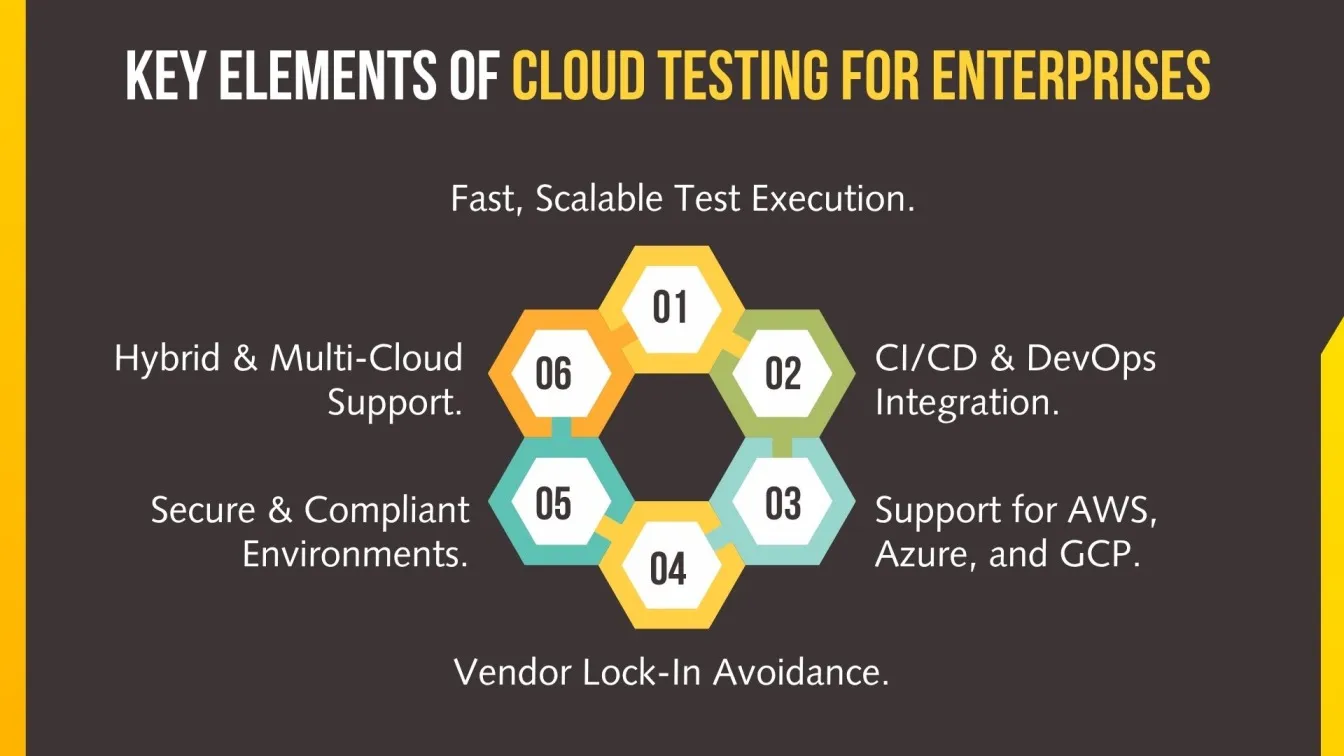
What’s next? Keep reading to discover:
📌 Why Cloud Testing Matters – Business value, scalability, and faster QA cycles in modern development.
📌 Key Features to Look For – Performance, flexibility, and integration in cloud testing platforms.
📌 Choosing the Right Cloud Provider – Comparing AWS, Azure, and Google Cloud for QA environments.
📌 Embedding QA into CI/CD – Seamless integration with pipelines and agile workflows.
📌 Tackling Security and Compliance – Handling data privacy, regulatory standards, and secure testing.
📌 Avoiding Common Pitfalls – How to prevent vendor lock-in and ensure hybrid/multi-cloud compatibility.
What Is Cloud-Based Testing and Why It Matters for Enterprises?
Cloud-based testing uses the capabilities of cloud computing to test systems, websites, or applications. Cloud testing enables businesses to conduct tests without requiring substantial on-premise gear or infrastructure, in contrast to traditional testing environments.
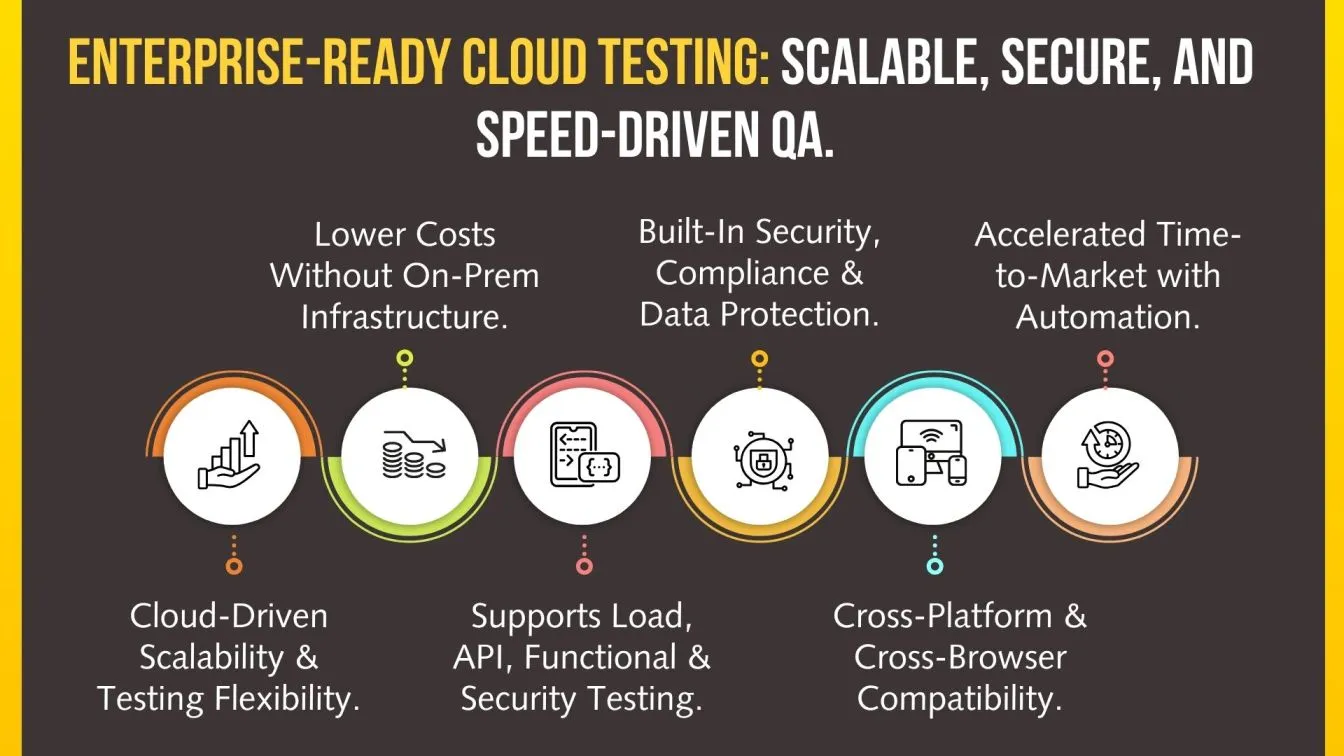
Key points to understand:
Cloud-based testing offers businesses scalable, adaptable, and reasonably priced QA solutions. It removes the need for complex infrastructure by enabling the quick execution of both automated and human tests using remote servers. Among the main benefits are:
- Scalable resources for fluctuating workloads.
- Support for load, penetration, and cloud app testing.
- Enhanced security with continuous vulnerability scanning.
- Faster releases with reduced testing costs.
- Built-in data protection and disaster recovery.
Why It Matters:
- Enables faster innovation for enterprises.
- Supports DevOps and CI/CD practices effectively.
- Reduces time-to-market for software releases.
- Maintains high-quality standards across multiple platforms.
- Acts as a strategic investment for digital transformation.
- Enhances competitive advantage in a rapidly evolving technology landscape.
Businesses can increase time-to-market, optimize resource usage, and effectively test across many devices and environments by implementing cloud-based testing.
Key Features to Look for in a Cloud Testing Platform
The success of a company depends on selecting the appropriate cloud testing platform. In addition to guaranteeing security and usability, the perfect platform should facilitate end-to-end testing, integration, and scalability.
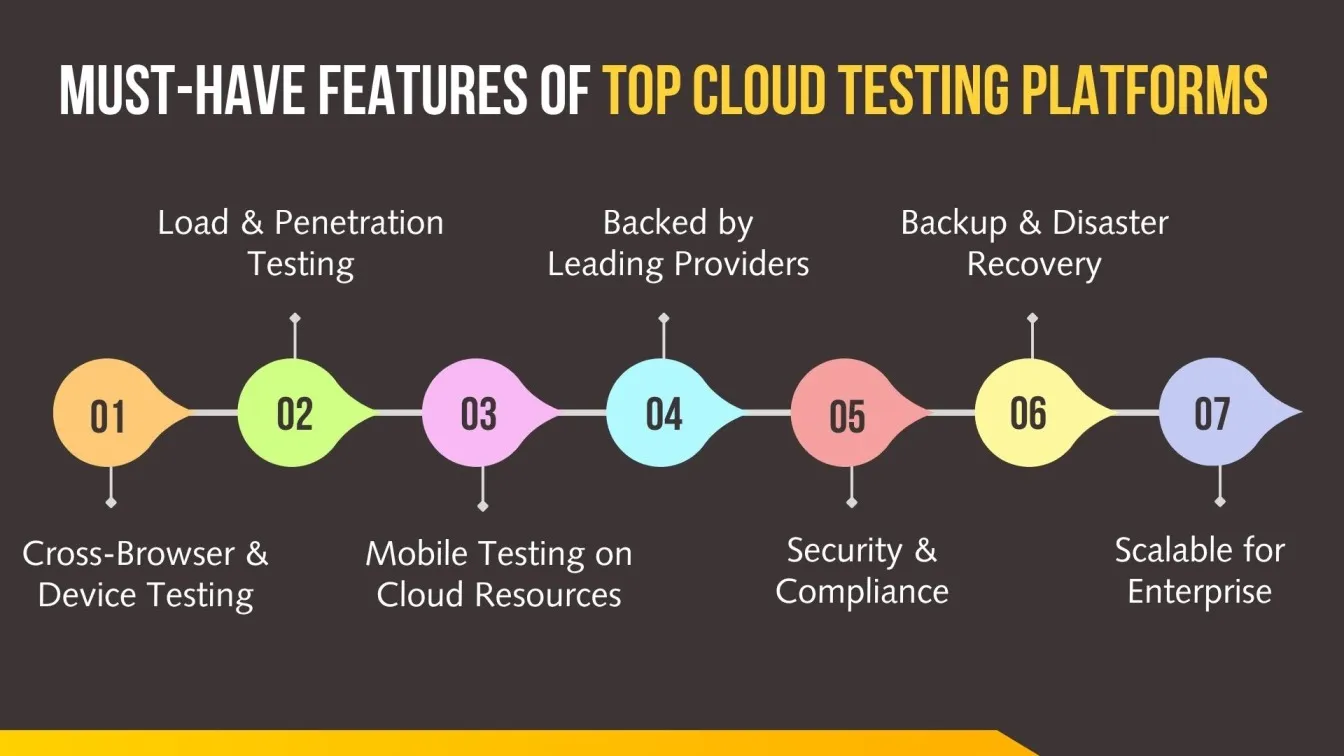
Key features to consider:
- Testing of cloud applications across browsers and devices is supported.
- Both cloud-based and integrated cloud load testing features.
- Tools for secure cloud penetration testing and cloud application security testing.
- Availability of cloud-based mobile testing resources for validating mobile applications.
- Supported by a reputable cloud service provider, such as Google Cloud or Microsoft Azure.
- Adaptable assistance from a managed cloud service provider.
- Equipped with cloud security testing technologies to ensure compliance.
- Scalability to manage users and traffic at an enterprise level.
- Infrastructure as a service (IaaS) and platform as a service option are available..
- Smooth software as a service (SaaS) application testing.
- Integrated disaster recovery and data backup systems.
A solid cloud testing platform is essential to enterprise QA strategy because it guarantees test performance, reliability, and compliance.
Top Cloud Testing Providers in 2025: A Comparative Overview
Choosing the best cloud testing service is essential to guaranteeing speed, security, and quality. The enterprise-grade features and extensive offers of a few leading cloud service providers in 2025 make them stand out.
AWS Device Farm
Offering extensive cloud mobile testing tools, AWS Device Farm is a potent cloud testing platform. Effective cross-browser testing, cloud, and application testing across several platforms is made possible by its broad device compatibility. You can guarantee thorough cloud application security testing and conduct cloud penetration testing services with AWS. The service is a great option for companies searching for a dependable and scalable cloud testing solution because of its interaction with AWS's larger cloud environment.
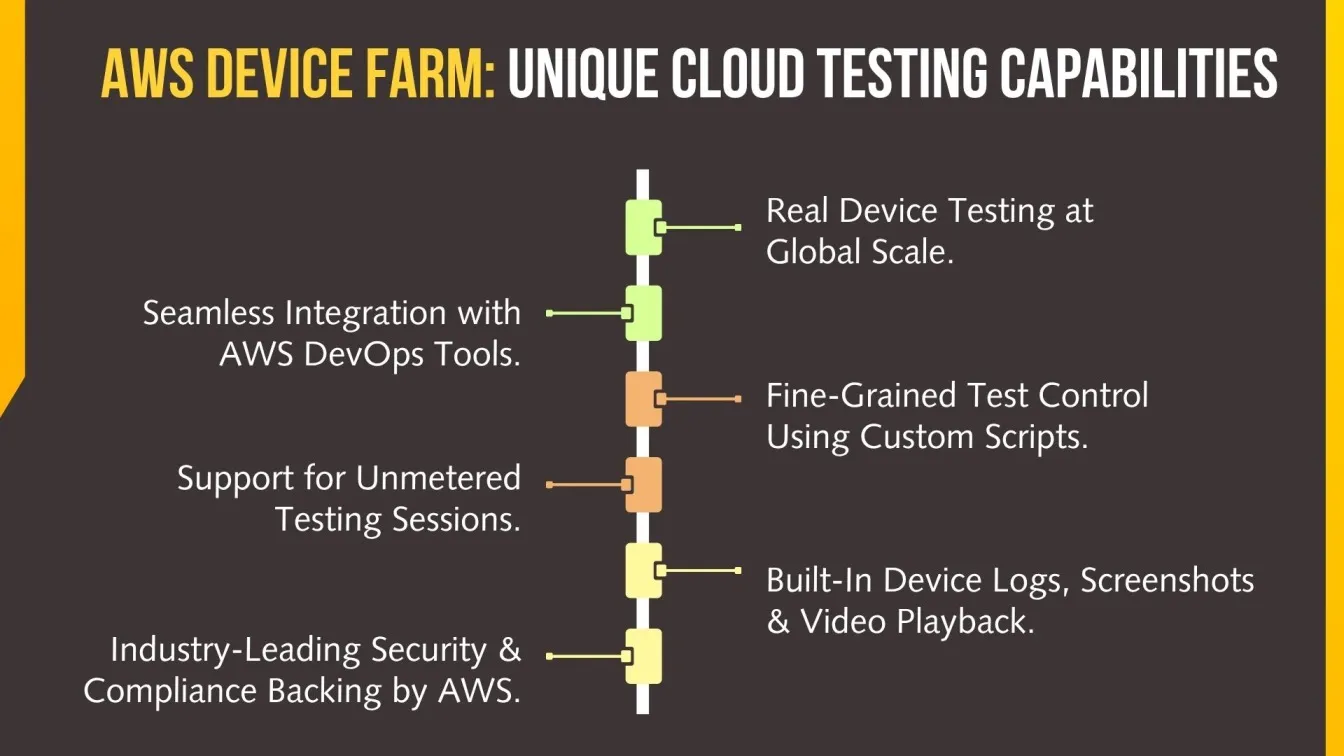
Microsoft Azure DevTest Labs
A fully managed infrastructure as a service in cloud computing platform designed specifically for cloud application testing is offered by Microsoft Azure DevTest Labs. A secure environment for conducting cloud load testing and performance assessments is guaranteed by its interaction with Azure's cloud security service provider. With Azure's platform-as-a-service (PaaS) offering, cloud testing tools may be seamlessly integrated with current CI/CD pipelines. For comprehensive testing scenarios, both cloud security and cloud penetration testing tools are supported.
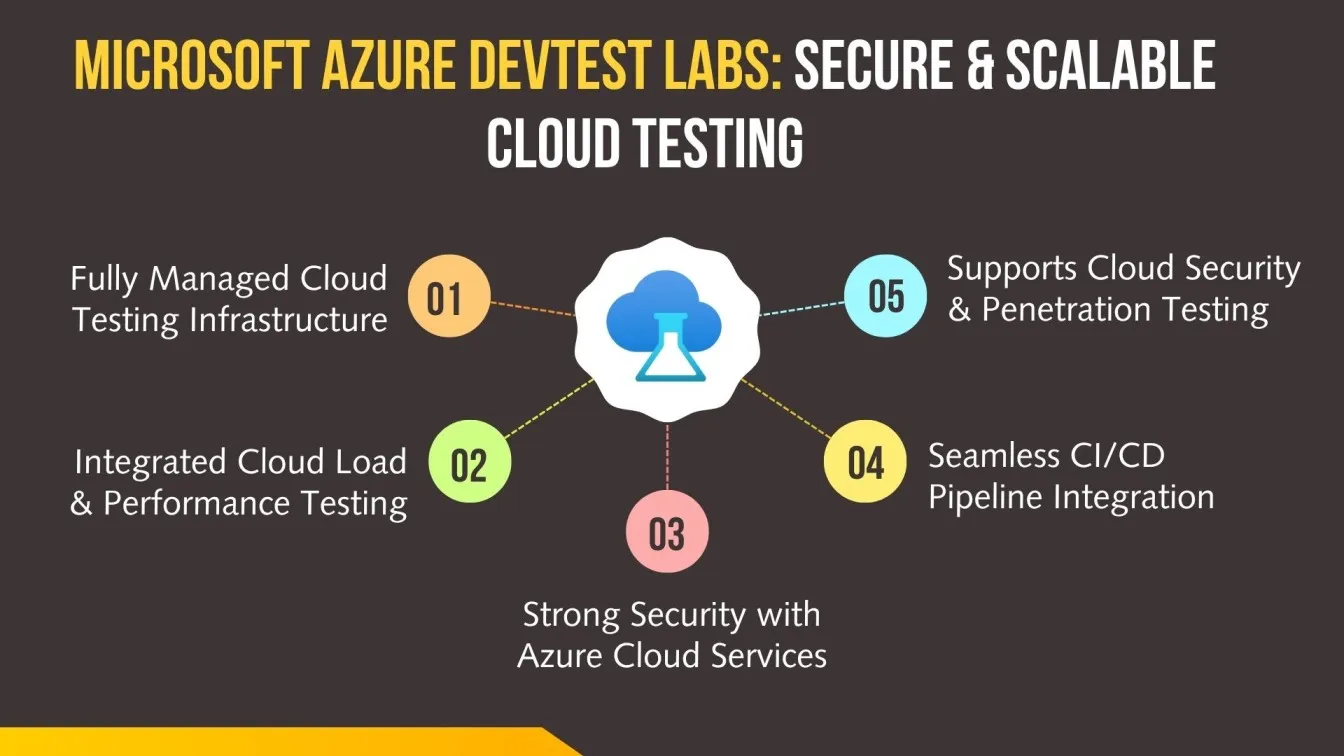
Google Cloud Test Lab
Google Cloud Test Lab is unique in that it provides flexible cloud testing services and is deeply integrated with Google's cloud ecosystem. It ensures the best possible performance and security for cloud applications by being an expert in cloud-based load testing and cloud penetration testing technologies. In order to guarantee high availability and data protection during testing, Google Cloud, a leading cloud service provider, provides a platform that supports cloud security testing tools and data backup disaster recovery plan solutions.
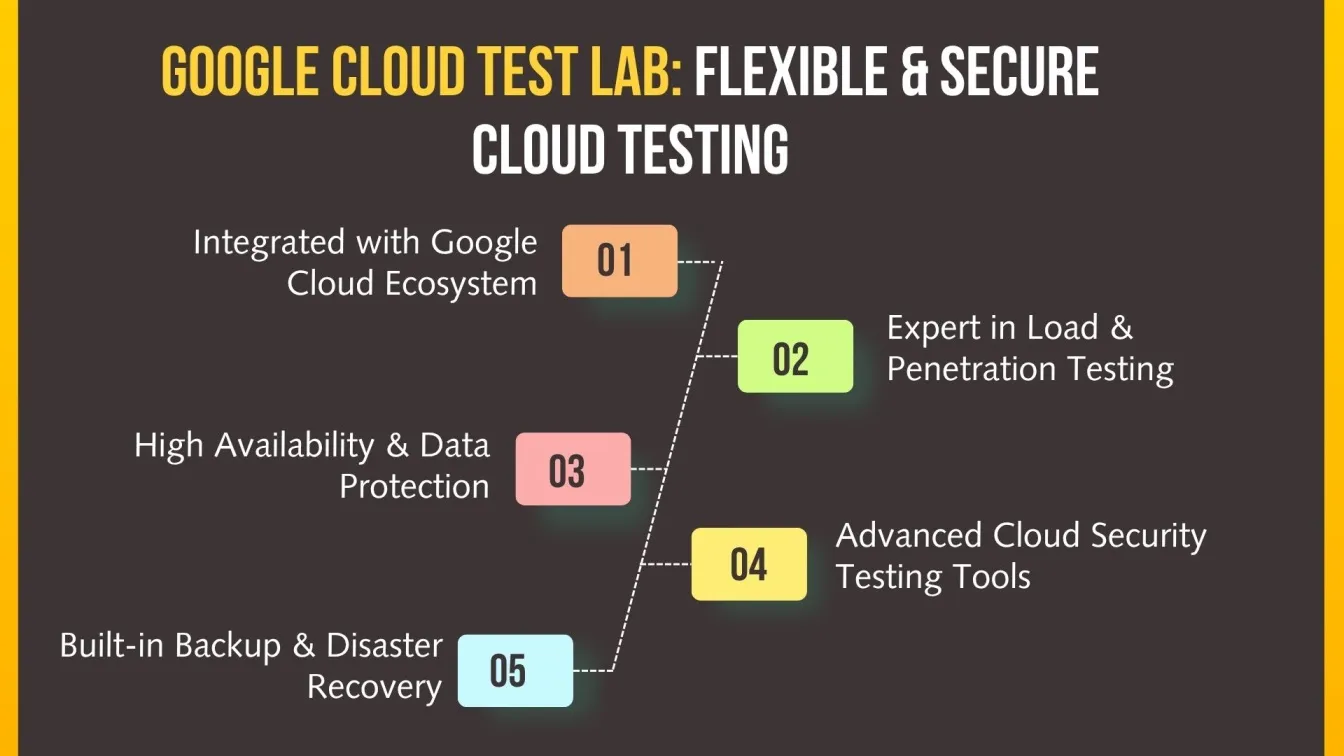
Sauce Labs
Offering a wide range of cross-browser testing cloud services, Sauce Labs is a top supplier of cloud testing tools. With interaction with well-known CI/CD pipelines, the platform facilitates thorough cloud mobile testing and cloud application security testing. Additionally, Sauce Labs offers cloud testing services and robust cloud load testing tools to assist businesses in effectively scaling and optimizing their apps.
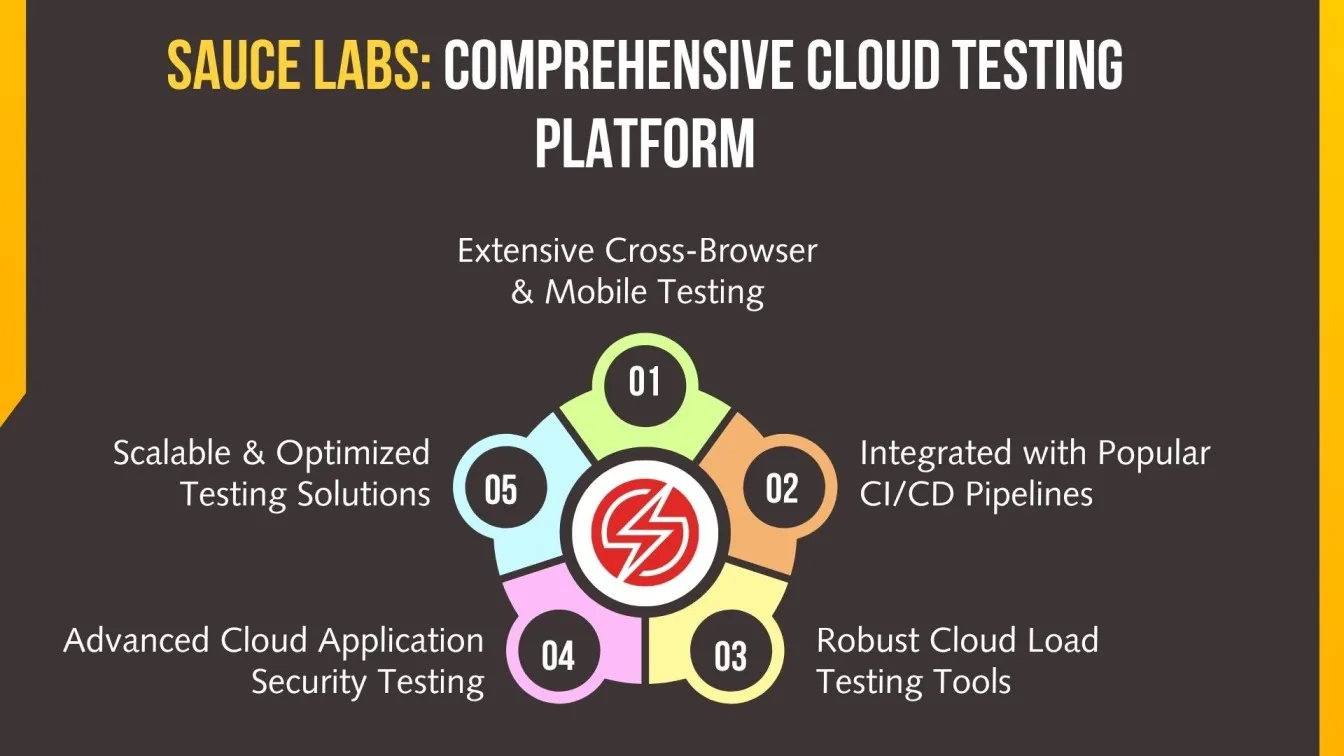
BrowserStack
BrowserStack specializes in cross-browser testing cloud services and provides high-quality cloud testing tools. Across all platforms and devices, this cloud testing service guarantees a flawless testing experience. BrowserStack provides cloud application security testing and cloud penetration testing services along with sophisticated features like cloud load testing and mobile testing tools to guarantee that apps are safe and effective in a variety of scenarios.
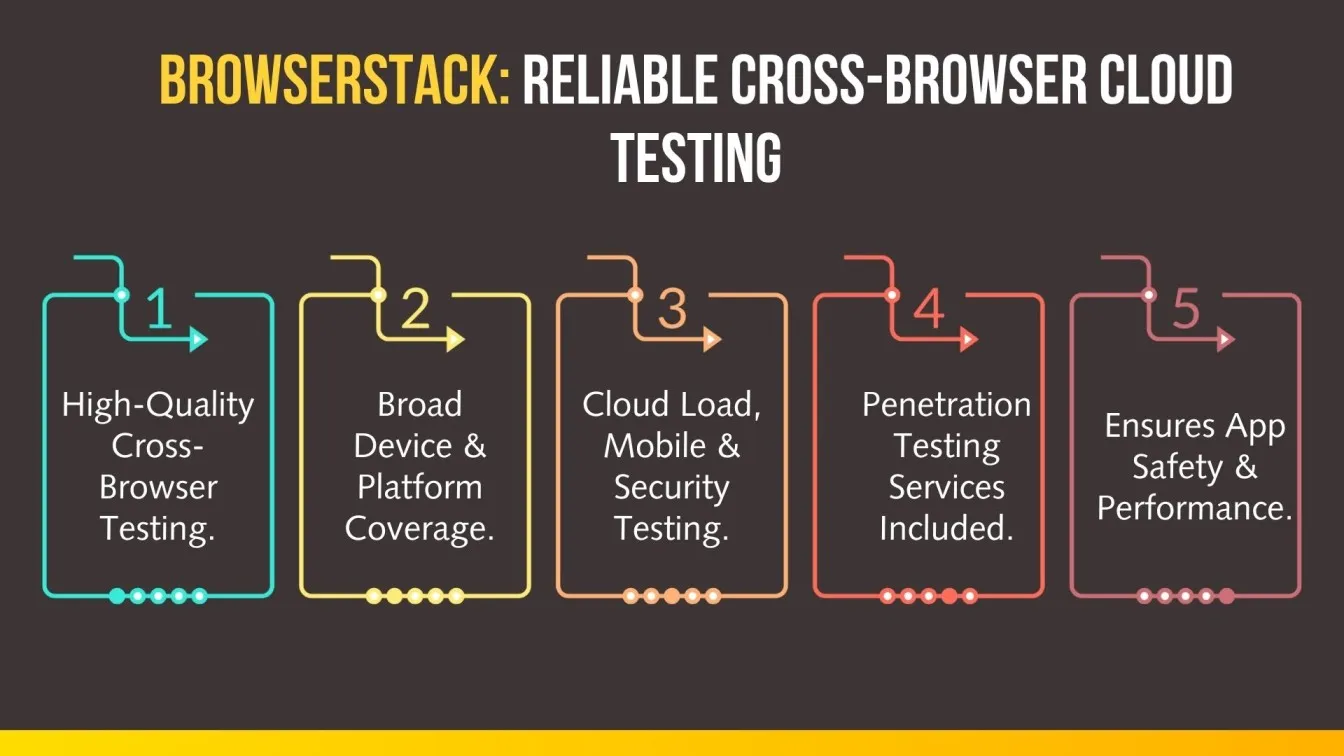
LambdaTest
Cloud-based load testing, cross-browser testing, and mobile testing tools are all supported by LambdaTest, a robust cloud testing platform. It enables thorough testing of cloud applications by integrating with numerous third-party technologies. Cloud security testing solutions from LambdaTest allow companies to do thorough cloud penetration testing and make sure their apps are safe and function well on all platforms and devices.
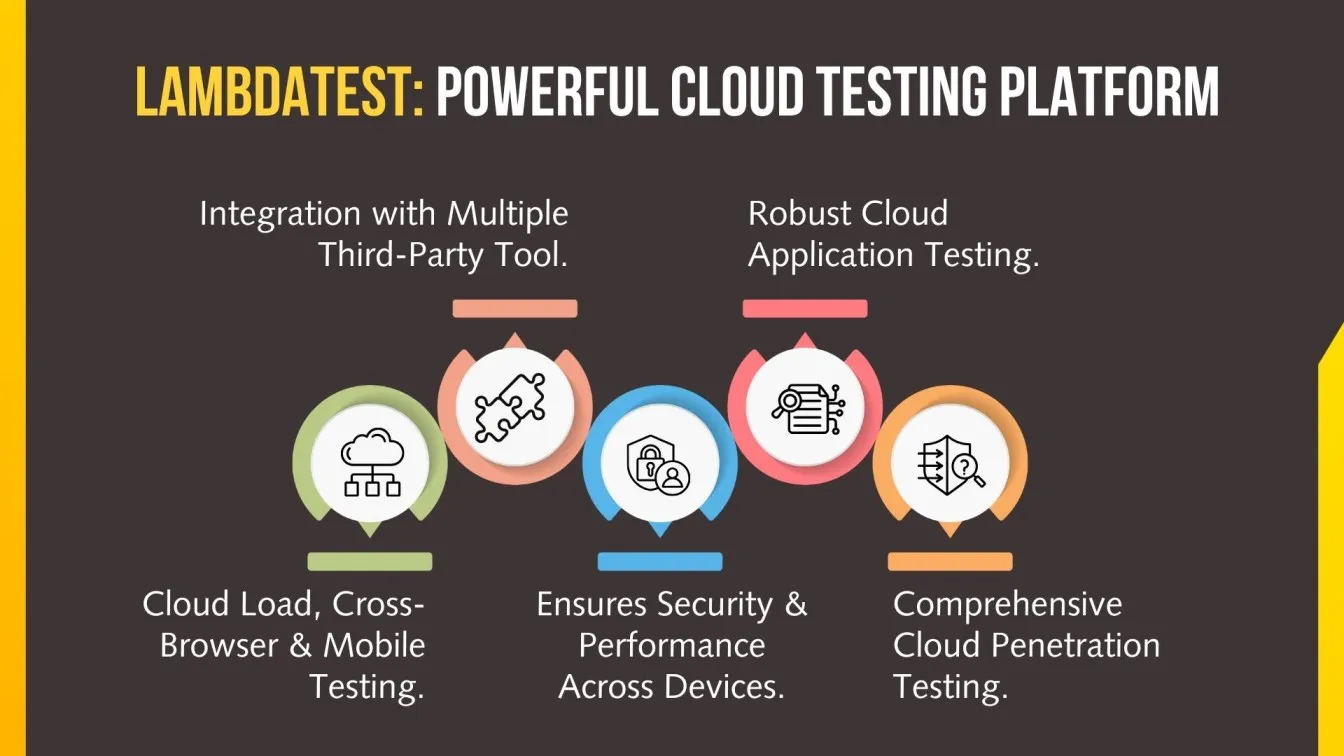
Integrating Cloud Testing with Existing Enterprise Systems
Even with legacy or hybrid infrastructures, cloud testing may increase accuracy and agility without interfering with daily operations. Businesses can save execution times and enhance the functionality of web and mobile software applications by substituting sophisticated testing capabilities for conventional technologies. Cloud testing guarantees thorough coverage across platforms by supporting simulated scenarios and various network conditions.
Key integration approaches include:
- Make use of cloud testing solutions that facilitate plugin-based and API-level integration.
- Make use of cloud testing solutions like Jenkins or Azure DevOps that integrate with CI/CD pipelines.
- Integrate test case management systems with cloud application testing.
- To replicate traffic from several regions, use cloud load testing tools.
- Include security testing for cloud applications in the DevSecOps cycle.
- To take care of environment configuration, collaborate with a cloud managed service provider.
- Utilize cloud-based mobile testing technologies that integrate with your current device labs to expand your mobile tactics.
- For scalable test environments, coordinate with the integration platform as a service in cloud computing and infrastructure as a service providers options.
- Use data backup and disaster recovery services to protect test data.
- When testing software as a service companies items in hybrid stacks, make sure they are interoperable.
Successful integration empowers enterprises to maintain quality while moving toward faster, continuous delivery models.
Security and Compliance Considerations in Cloud Testing
Businesses must put security and compliance first when implementing cloud testing services in order to safeguard confidential information and adhere to legal obligations. This guarantees the security of applications and test data throughout the testing process.
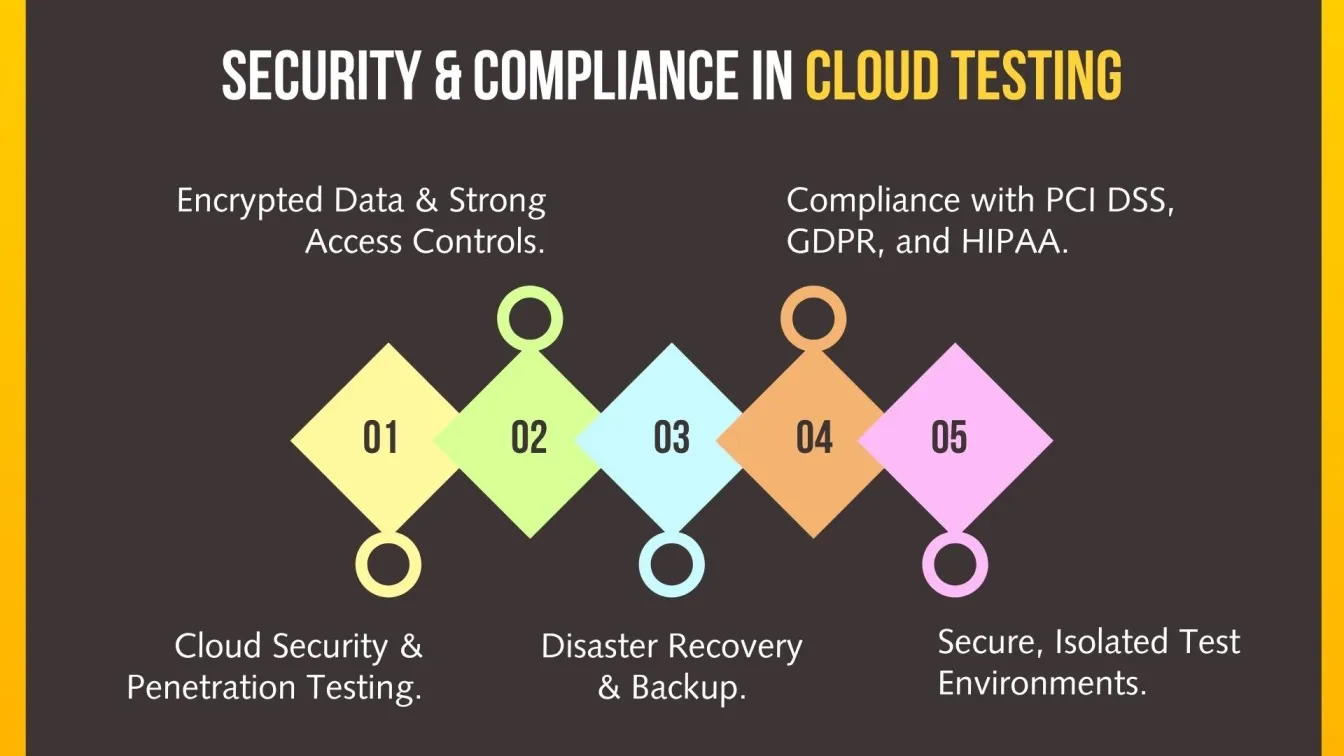
Key security and compliance considerations include:
- Testing for cloud application security is crucial for finding flaws in apps hosted on the cloud.
- Make sure that prospective threats are simulated using cloud penetration testing services.
- Select cloud security testing tools that meet industry requirements like PCI DSS, GDPR, and HIPAA.
- Use encrypted cloud testing tools to handle test data securely.
- Verify that cloud service providers have robust data security features, such as safe access controls.
- Include software as a service (SaaS) compliance checks in your cloud testing procedure
- Check to see if cloud-managed service providers adhere to best practices for incident response and security monitoring.
- Make use of cloud load testing tools that check for scalability and DDoS resilience.
- To guarantee data availability during catastrophes, incorporate disaster recovery and data backup services.
- When evaluating cloud applications, use encryption and safe protocols for data transit and storage.
- Make sure the compliance reporting for audits is supported by your cloud testing platform.
- Choose cloud-based cross-browser testing solutions that provide safe, separate testing environments.
A safe, reliable cloud testing environment is based on security and compliance. Ensuring both helps sustain stakeholder confidence and shields businesses from threats.
Avoiding Vendor Lock-In in Cloud Testing Solutions
Selecting cloud testing solutions that enable portability and simple migration is essential because vendor lock-in can eventually reduce flexibility and raise expenses. Businesses can maintain control over their testing environments by avoiding lock-in.
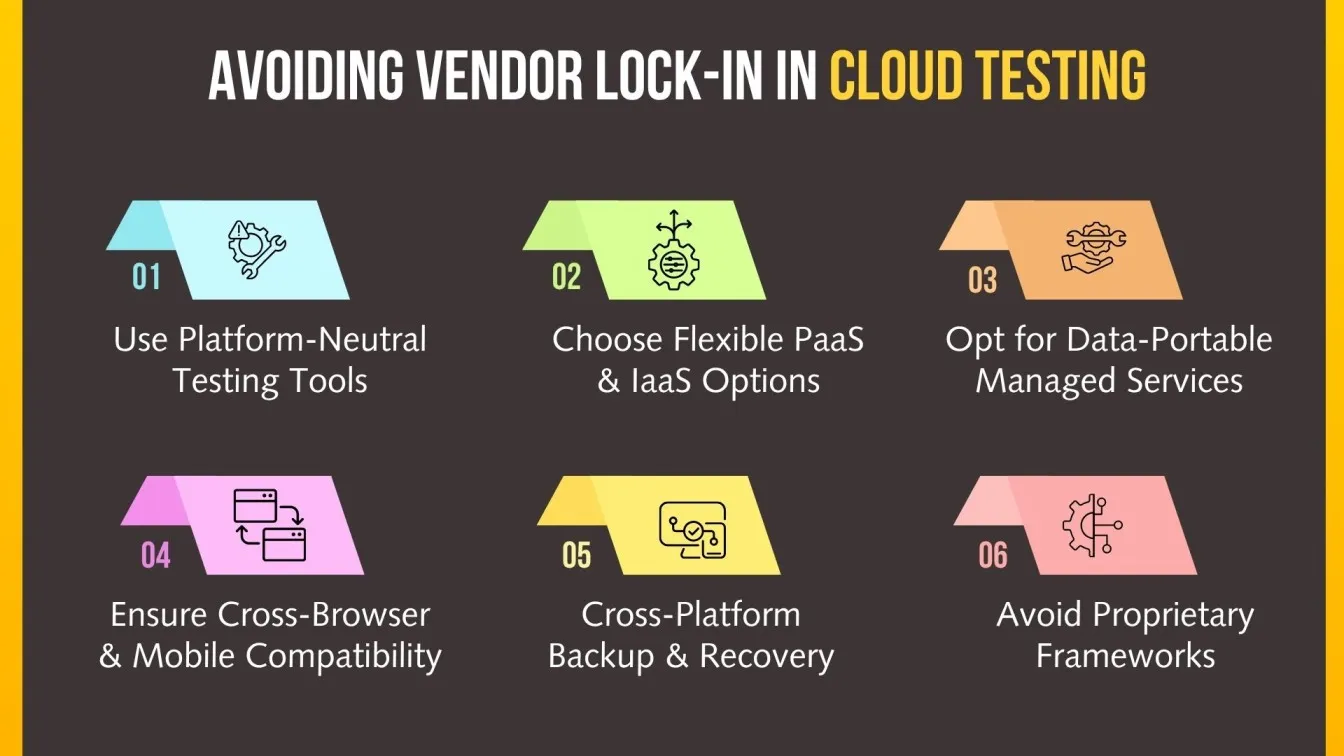
Tips to Avoid Vendor Lock-In in Cloud Testing:
- For interoperability with several providers, use platform-neutral cloud testing tools.
- Verify that cross-browser and mobile testing tools are compatible with all vendors.
- Select penetration testing and cloud load testing solutions that work with third-party environments.
- Choose PaaS and IaaS with flexible migration options.
- Choose managed service suppliers who provide data portability.
- Steer clear of proprietary frameworks that limit provider change.
- Make disaster recovery and backup services cross-platform compatible.
Businesses can make sure they preserve flexibility, cut expenses, and enhance scalability in their cloud testing strategy by avoiding vendor lock-in.
Ensuring Interoperability Across Multiple Cloud Platforms
Effective cloud testing necessitates interoperability across several cloud platforms since enterprises frequently employ multiple cloud providers for different services. This guarantees consistent performance in various situations and permits smooth communication between systems.
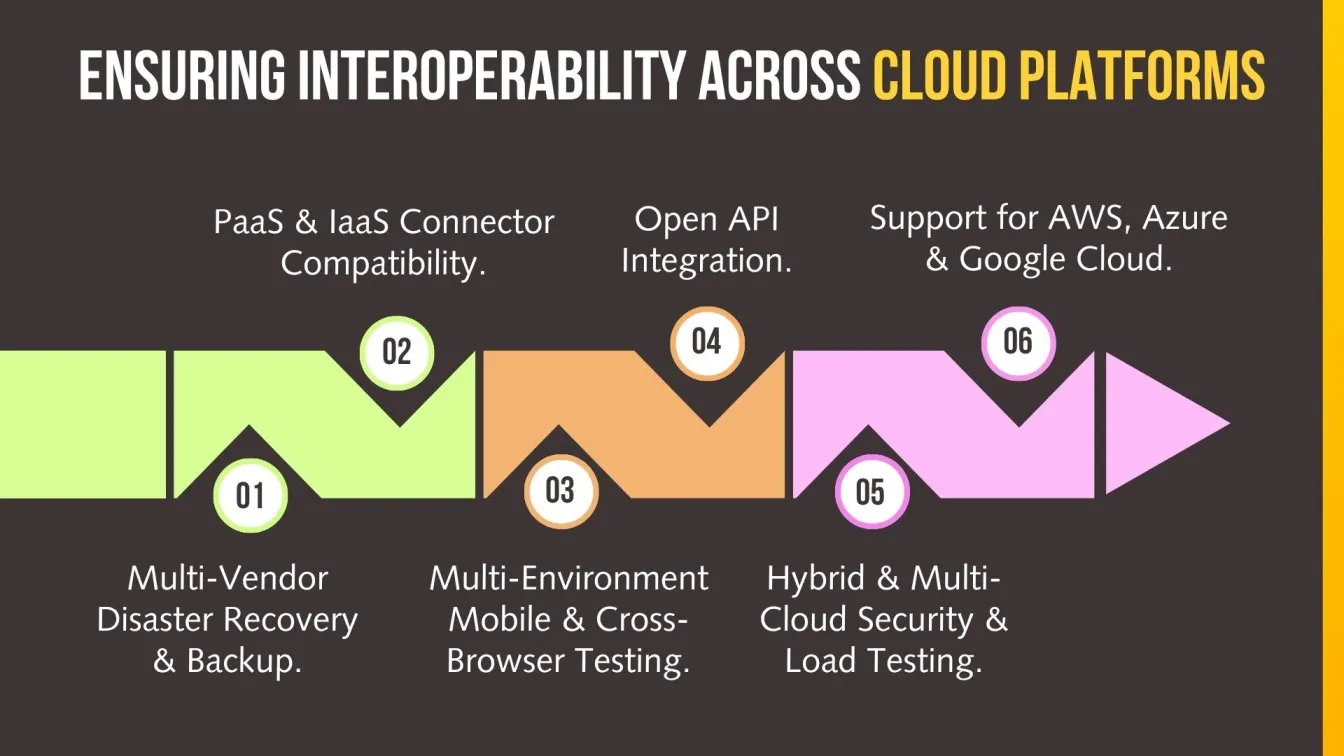
Key Approaches to Achieve Interoperability in Cloud Testing:
- Make use of products that are interoperable with popular providers such as AWS, Azure, and Google Cloud.
- Make sure that both PaaS and IaaS connectors are supported.
- Use cloud mobile and cross-browser testing tools in a variety of settings.
- Select penetration testing, load testing, and security tools that are compatible with hybrid and multi-cloud environments.
- For flexible integration, use systems with open APIs.
- For increased resilience, use disaster recovery and backup services from several suppliers.
Businesses may optimize the flexibility and advantages of utilizing several cloud platforms for testing without sacrificing effectiveness or security by guaranteeing interoperability.
Steps to Transition to Cloud-Based Testing Successfully
Making the switch to cloud-based testing can revolutionize businesses, but it takes proper preparation and implementation. These procedures optimize testing procedures while assisting in ensuring a successful and seamless migration.
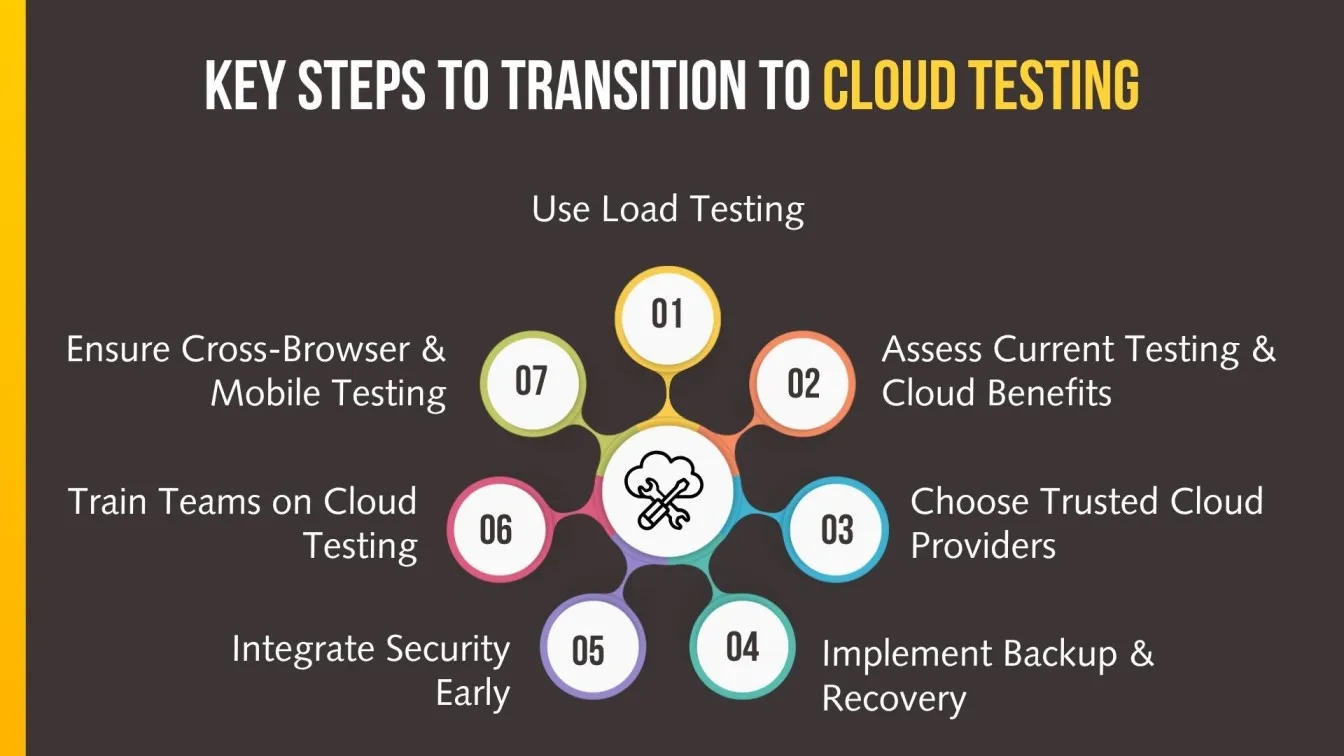
Key Steps to Transition to Cloud-Based Testing:
- Examine the advantages of cloud testing platforms and evaluate your present testing configuration.
- Select reputable cloud service providers, such as Google Cloud or Azure.
- Use cross-browser and mobile testing tools to make sure coverage is maintained.
- For compliance, incorporate penetration testing and security early on.
- Educate teams on cloud testing procedures and technologies.
- To simulate traffic in the real world, use cloud load testing.
- Use disaster recovery and data backup to protect the transition.
- SaaS and other software should be gradually moved to the cloud.
- For assistance, collaborate with cloud-managed service providers.
Organizations can improve testing efforts, expedite functional testing, and guarantee dependable cross-browser performance testing in the cloud by utilizing cloud-based services and strong cloud infrastructure.
Common Pitfalls to Avoid When Choosing a Cloud Testing Provider
Selecting the best cloud testing company is crucial to guaranteeing effective, safe, and dependable testing. Businesses should, however, steer clear of a few typical errors to avoid problems later on.
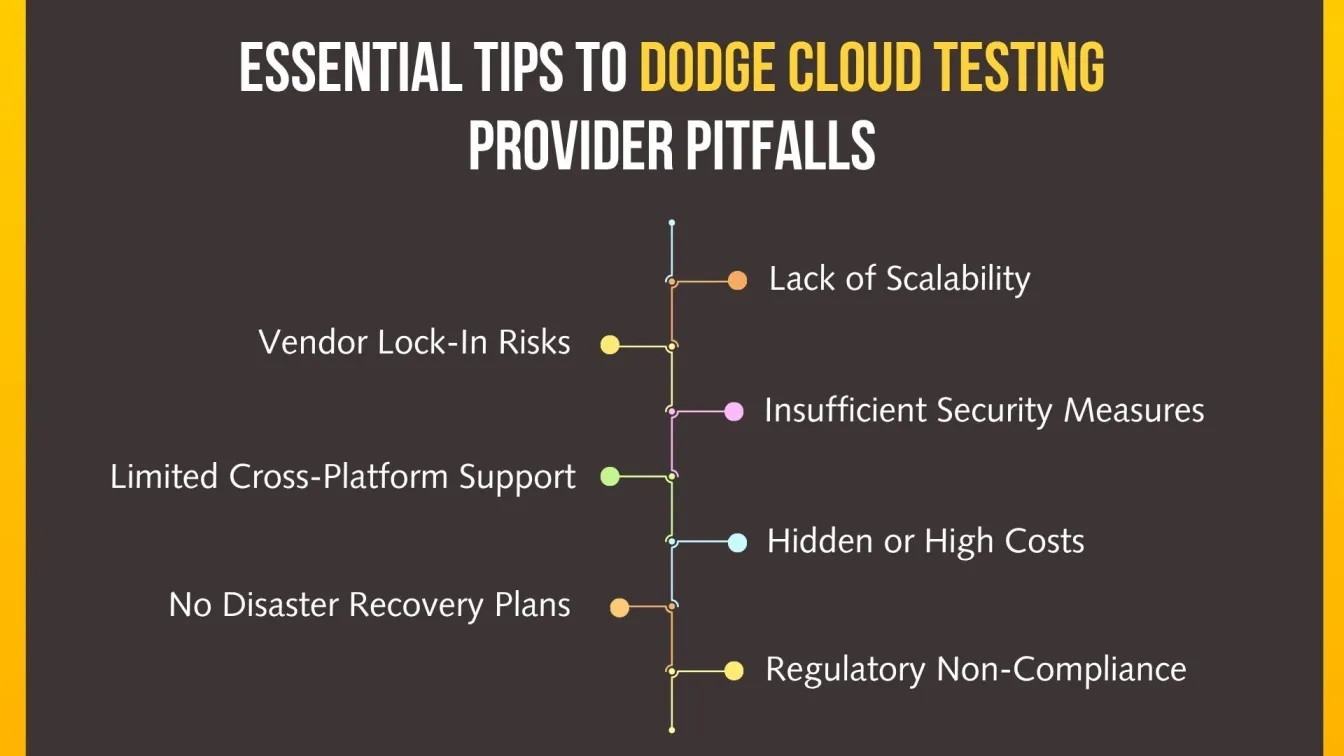
Here are key pitfalls to watch for when selecting a cloud testing service:
- Lack of scalability: Make sure the service cloud provider can grow with your business, particularly when it comes to load testing.
- Vendor lock-in: Steer clear of suppliers who restrict integration or migration in order to reduce flexibility.
- Insufficient security: Select cloud security and penetration testing providers that adhere to industry standards.
- Restricted cross-platform compatibility: Confirm that mobile and cross-browser testing tools are supported.
- Expensive services: Watch out for hidden fees or intricate pricing that raises the cost of ownership.
- Absence of disaster recovery plans: Verify that solutions for data backup & disaster recovery are covered.
- Regulatory non-compliance: Verify that the provider complies with relevant regulations, such as HIPAA or GDPR.
By avoiding these pitfalls, enterprises can choose a cloud testing service that delivers reliable, scalable, and secure testing while supporting long-term growth and compliance.
Conclusion: Making the Right Choice for Your Enterprise
Selecting the right cloud-based testing tools is essential for enhancing testing efficiency, improving software quality assurance, and accelerating the release cycle. With support for automated testing, manual testing, and various types of tests including regression, API, and Usability testing modern platforms help teams meet diverse testing requirements across cloud environments and mobile devices.
Cloud testing enables parallel tests, reducing testing time and uncovering performance issues early in the development cycle. By integrating with version control systems and continuous integration pipelines, teams benefit from seamless integration and faster feedback loops. Features like video recordings, machine learning, and real-time insights improve visibility into user interactions and testing outcomes.
Using cloud-based testing environments also ensures cost efficiency, minimizing infrastructure costs and additional costs associated with physical devices. Providers offering scalable pricing models, support for cross-browser and mobile app testing, and access to advanced tools enable comprehensive test coverage under realistic network conditions.
Ultimately, leveraging cloud computing resources for testing leads to faster releases, better handling of potential issues, and delivery of high-quality software across all screen sizes and platforms.
People Also Ask
How does cloud-based testing differ from traditional on-premise testing?
In contrast to conventional on-premise testing configurations, cloud-based testing provides scalability, flexibility, and cost-effectiveness.
What industries benefit the most from cloud-based testing services?
For quicker implementation and compliance, cloud-based testing services are particularly advantageous for sectors including finance, healthcare, retail, and e-commerce.
How can enterprises leverage cloud testing for both performance and reliability assurance?
Cloud testing is used by businesses to guarantee high performance and dependability through real-time analytics and scalable settings.
What role does containerization (like Docker) play in cloud-based testing?
Cloud-based testing operations can benefit from uniform, segregated, and repeatable testing environments made possible by containerization solutions such as Docker.
What KPIs should enterprises track to measure cloud testing success?
Test coverage, defect density, test execution time, system uptime, and user satisfaction ratings are important KPIs for successful cloud testing.



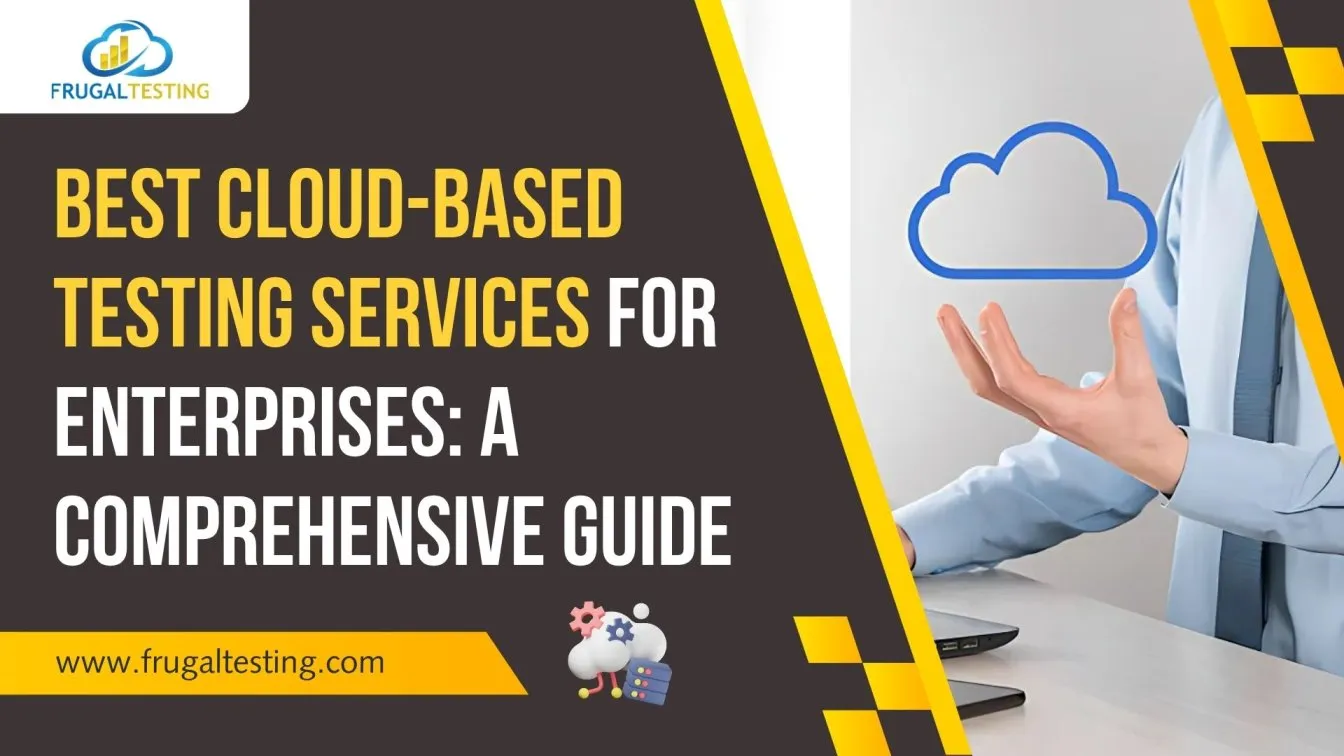
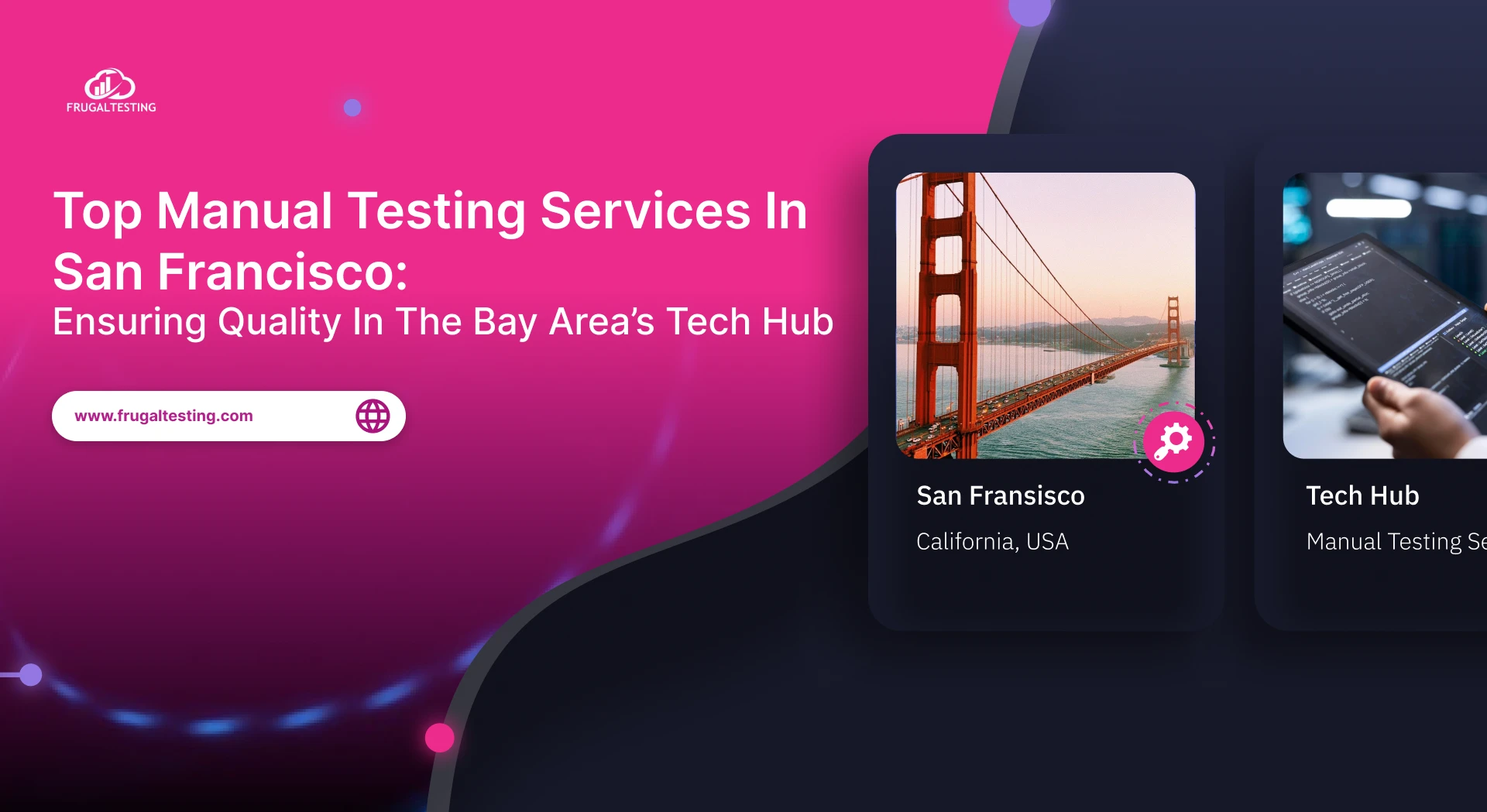
%201.webp)

